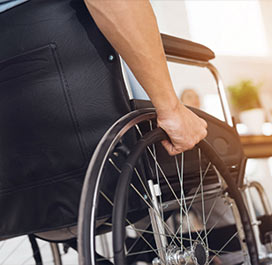
September 3, 2020
- Categories:
- Bankruptcy
Legal Counsel on Filing for Bankruptcy in Montgomery
Disability, injury, or illness may force you to file for bankruptcy. Health insurance may not offer enough protection against the loss of savings in the event of one or more illnesses or injuries. You may have to pay not only for the doctor bills but also rehabilitation and occupational therapy costs. Many people in this position must max out their credit cards and are then unable to pay off the credit card debt. Workers’ compensation may not for pay everything, particularly if the workers’ compensation insurer challenges your entitlement to benefits. Filing for bankruptcy with the guidance of an experienced Montgomery attorney can be a solution. Charles Grainger can advise you on whether this path makes sense for you.
Disabled Workers Can Benefit from Filing Under Chapter 7
Since filing for Chapter 13 bankruptcy requires you to repay a substantial portion of your debts, filing for Chapter 7 is likely to be more advantageous to anyone who is physically disabled or unable to work. Seeking to file for Chapter 7 bankruptcy means that you will need to pass a “means test,” which evaluates whether your financial situation is sufficiently grave for you to pursue this solution. This is generally not a difficult test to pass, however, for injured workers who have burned through their savings to pay off medical and credit card debt and who are unable to work.
Chapter 7 can be very helpful to those with medical debt and debt associated with disabilities. Medical debts and most credit card debts are not secured by collateral. This means that you often can get a discharge of these debts within three or four months after filing for Chapter 7 bankruptcy. As soon as you file for bankruptcy, an automatic stay goes into effect. Collection agencies and hospitals that are notified of your filing will be prevented from continuing to call and harass you. They also will not be able to file or continue collection lawsuits.
What if you were injured or disabled at work and have received some monthly income through the workers’ compensation system, even though you are unable to work? Exemptions determine whether you can keep particular kinds of property or not after filing for bankruptcy under Chapter 7, and how much you must pay to creditors in Chapter 13. Under Alabama’s exemption system, you can keep your workers’ compensation benefits even though you have filed for Chapter 7 bankruptcy.
Consult an Alabama Bankruptcy Attorney
Filing for bankruptcy is time-consuming and detail-oriented. It is easy to forget a few debts when listing all the debts you would like to have discharged or to misunderstand some aspect of the bankruptcy process. If you are trying to pay off your medical bills while worrying about an uncertain financial future, it can make a huge difference to have advice and representation from a knowledgeable bankruptcy attorney in Alabama. Charles Grainger can help you seek a discharge of your debts. We serve South-Central Alabama clients from our offices located in Montgomery, Prattville, and Troy. Call us at (334) 260-0500 or contact us through our online form.



 Attorney Charles Grainger possesses decades of legal experience focused on debtor-creditor law, bankruptcy, and business law. His legal work is designed to help clients overcome debt and secure a stronger financial footing. He also provides legal services to entrepreneurs and business owners. Grainger Legal Services takes a comprehensive approach to debt relief and financial education for clients in south-central Alabama. [
Attorney Charles Grainger possesses decades of legal experience focused on debtor-creditor law, bankruptcy, and business law. His legal work is designed to help clients overcome debt and secure a stronger financial footing. He also provides legal services to entrepreneurs and business owners. Grainger Legal Services takes a comprehensive approach to debt relief and financial education for clients in south-central Alabama. [